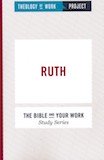Ruth and Parables: Small Group Leaders Guide Week 4

This content is part of the Ruth and Parables curriculum, an 11-week integrated sermon and small group series on faith and work.
Read Ruth 2:1-4
Topic 1 – Blessing
Excerpt From the Theology of Work Bible Commentary:
'The main characters acknowledge God as the foundation for their work by the way they bless each other and through their repeated declarations of faith. All of these blessings express the assurance that God is at work to provide for his people. Ruth desired to receive God’s blessing of productivity, whether from God himself (Ruth 2:12) or through a human being “in whose sight I might find favor” (Ruth 2:2). Despite being a Moabite, she was wiser than many in Israel when it came to recognizing the Lord’s hand in her work. For the action of the story, one of the most important blessings from God is that he had blessed Boaz with a productive farm (Ruth 2:3). Boaz was fully aware of God’s role in his labor, as shown in his repeated invoking of the Lord’s blessing (Ruth 2:4; 3:10).'
Questions
What, specifically, does Boaz mean when he says to his workers, “The Lord be with you!”? What, specifically do them mean when they reply, “The Lord bless you!”? Is this just a formality, like when you say “God bless you,” after someone sneezes, or do they have a particular blessing or hope in mind?
Think of the first three people you will see the next time you go to your place of work (any kind of work, not necessarily paid work). Imagine saying “God bless you” each of them (or at least thinking it to yourself). What particular blessing would you want for each one? How do you think God could provide that blessing?
Topic 2 – Non-Foolish Hope
Excerpt From the Theology of Work Bible Commentary:
'One of the ways God fulfills his promise of fruitfulness is his mastery of the world’s circumstances. The odd construction of “her chance chanced upon” (rendered, “as it happened” by the NLT) in Ruth 2:3 is deliberate. In colloquial English, we would say, “As her luck would have it.” But the statement is ironic. The narrator intentionally uses an expression that forces the reader to sit up and ask how it could be that Ruth “happened” to land in the field of a man who was not only gracious (Ruth 2:2) but also a kinsman (Ruth 2:1). As the story unfolds, we see that Ruth’s arrival at Boaz’ field was evidence of God’s providential hand. The same can be said for the appearance of the next-of-kin just as Boaz sat down at the gate in Ruth 4:1–2.
'What a dreary world it would be if we had to go to work every day expecting nothing except what we ourselves have the power to accomplish. We must depend on the work of others, the unexpected opportunity, the burst of creativity, the unforeseen blessing. Surely one of the most comforting blessings of following Christ is his promise that when we go to work, he goes to work alongside us and shoulders the load with us. “Take my yoke upon you…for my yoke is easy, and my burden is light” (Matthew 11:29-30).'
Questions
Is the productiveness of Boaz’s farm a blessing from God or the result of good strategizing and planning?
Think of a unit of work that you’ve been successful in. What were the key factors for success? Which ones were you in control of, and which ones depended on circumstances? Would you say, like Steve’s businessman friend, that your success is mostly the result of good strategy and planning?
Read Mark 4:26-32
Topic 3 – Choosing Hope
According to the fill-in sheet from Steve’s sermon
Hope is investing in the best options we have, whether or not they seem good enough.
Hope is trusting that God can do what none of us can.
Hope is confident expectation, based on evidence that not everyone is seeing.
Questions
What would actions would you need to take during the next year to invest in the best options you have? To make this investment pay off, what would God have to do that you are not able to do on your own?
What evidence, if any, do you have that it is reasonable to hope for God to master the circumstances needed for the investment to be worthwhile?
Steve said that anger is a clue to where your hope is flagging. What have you been the most angry about over the past month in your work? What would you have to hope for to overcome or resolve this anger? Would it be foolish to hope for that?








